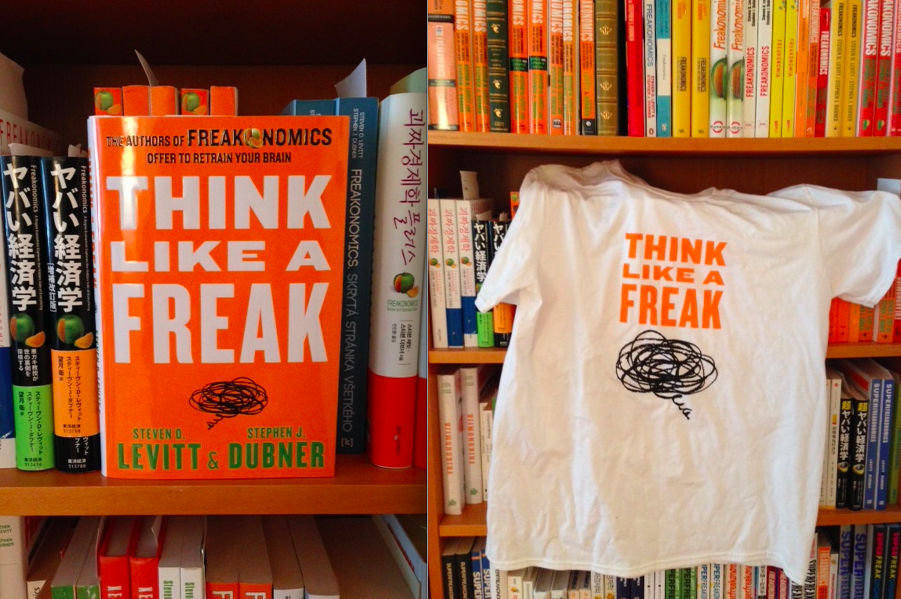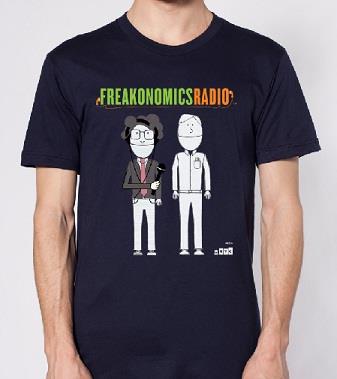Join the Think Like a Freak Book Club — and Win an Autographed Copy!
Our new book, Think Like a Freak, has just been published and we’d like to talk about it with you. So we are forming the Think Like a Freak Book Club.
How does it work? You write in your questions/comments/complaints in the comments section below and we’ll respond to some of them in our podcast. For now, we’re planning to do three episodes of the Book Club. (But if you know us even a little bit, you know we won’t be afraid to quit after one if it doesn’t work out!) Since there are nine chapters in the book, let’s start with questions that pertain to Chapter 1, 2, and 3 of Think. Those are: “What Does It Mean to Think Like a Freak?,” “The Three Hardest Words in the English Language,” and “What’s Your Problem?”
If we choose your question for the podcast, we’ll send you a signed copy of Think Like a Freak or a limited edition Think Like a Freak t-shirt. Thanks!

You can also pick an item from our swag page, or opt for a Freakonomics Radio t-shirt.

Here’s the TOC for Chapters 1, 2, and 3:
1. What Does It Mean to Think Like a Freak?
An endless supply of fascinating questions . . . The pros and cons of breast-feeding, fracking, and virtual currencies . . . There is no magic Freakonomics tool . . . Easy problems evaporate; it is
the hard ones that linger . . . How to win the World Cup . . . Private benefits vs. the greater
good . . . Thinking with a different set of muscles . . . Are married people happy or do happy people marry? . . . Get famous by thinking just once or twice a week . . . Our disastrous meeting with the future prime minister.
2. The Three Hardest Words in the English Language
Why is “I don’t know” so hard to say? . . . Sure, kids make up answers but why do we? . . . Who believes in the devil? . . . And who believes 9/11 was an inside job? . . . “Entrepreneurs of error” . . . Why measuring cause-and-effect is so hard . . . The folly of prediction . . . Are your predictions better than a dart-throwing chimp? . . . The Internet’s economic impact will be “no greater than the fax machine’s” . . . “Ultracrepidarianism” . . . The cost of pretending to know more than you
do . . . How should bad predictions be punished? . . . The Romanian witch hunt . . . The first step in solving problems: put away your moral compass . . . Why suicide rises with quality of life— and how little we know about suicide . . . Feedback is the key to all learning . . . How bad were the first loaves of bread? . . . Don’t leave experimentation to the scientists . . . Does more expensive wine taste better?
3. What’s Your Problem?
If you ask the wrong question, you’ll surely get the wrong answer . . . What does “school reform” really mean? . . . Why do American kids know less than kids from Estonia? . . . Maybe it’s the parents’ fault! . . . The amazing true story of Takeru Kobayashi, hot-dog-eating champion . . . Fifty hot dogs in twelve minutes! . . . So how did he do it? . . . And why was he so much better than everyone else? . . . “To eat quickly is not very good manners” . . . “The Solomon Method” . . . Endless experimentation in pursuit of excellence . . . Arrested! . . . How to redefine the problem you are trying to solve . . . The brain is the critical organ . . . How to ignore artificial barriers . . . Can you do 20 push-ups?

Comments